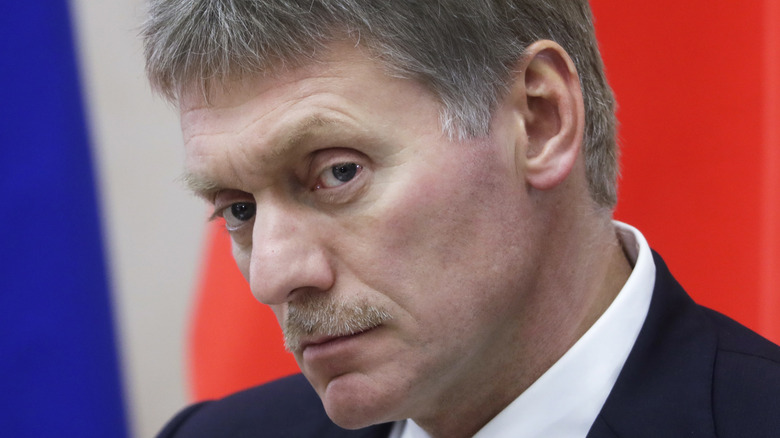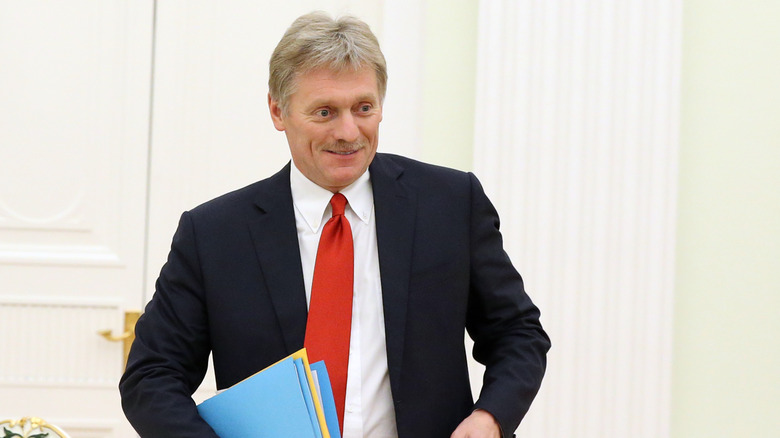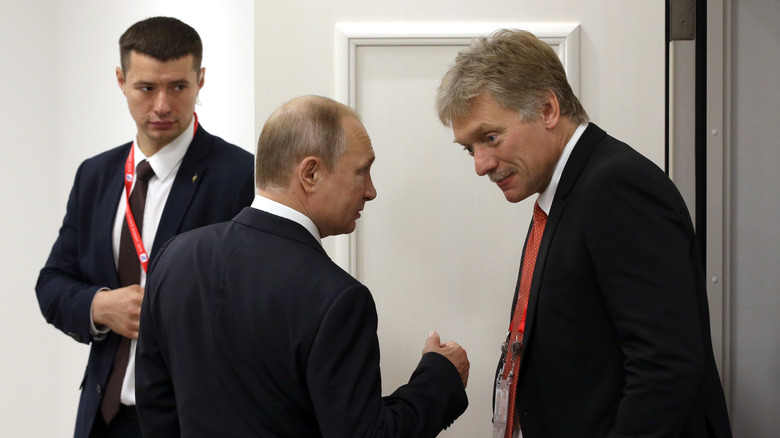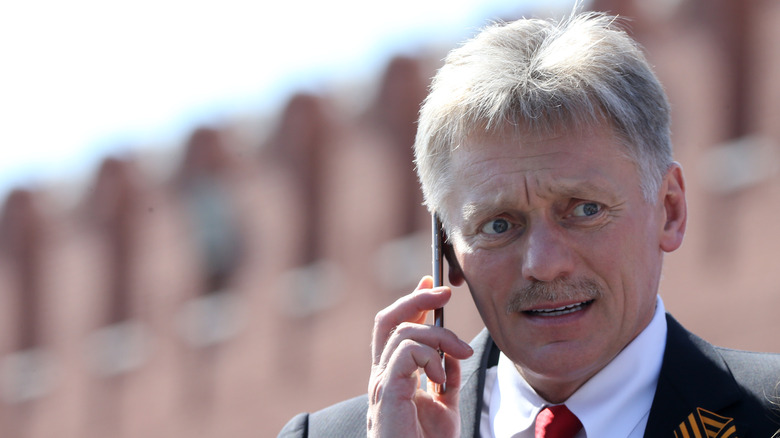Who Is Vladimir Putin's Spokesman, Dmitry Peskov?
During the Russian invasion of Ukraine in 2022, Russian President Vladimir Putin's mouthpiece was Press Secretary Dmitry Peskov, who was tasked with facing the media as animosity toward his country increased. "Unfortunately, in a situation that's extremely tense, especially in such countries as the US, hatred toward Russia is escalated hysterically and off the charts," he told reporters, according to TASS, a Russian news agency. "It's hard to pick the right words in a situation like this." He added: "Of course, not everybody is able to keep a cool head or be in their right mind these days, so many people unfortunately are losing it."
According to Roscongress, Peskov has made a career working in both the Soviet Union and the Russian governments. But he came under fire in 2022 for his role in Russia's military operations in Ukraine, with the White House going so far as calling him the "top purveyor of Putin's propaganda," per Forbes.
Peskov's Early Career
Dmitry Peskov was born in Moscow on October 17, 1964 (via the Database of Free Russia Forum). Peskov has politics in his blood, as his father, Sergey, was the Soviet ambassador to Pakistan. In 1989, Peskov graduated from the Asia and Africa Institute of Moscow State University, and the same year, he started working for the Soviet Foreign Ministry, according to Roscongress.
In 1990, he took a job at the Russian embassy in Ankara, Turkey, where he held several roles and worked there through the fall of the Soviet Union, staying until 1994. He then spent two years at the Russian Foreign Ministry in Moscow for two years but returned to Ankara for a second stint at the Russian embassy, where he stayed until 2000.
Vladimir Putin took office in 1999 (per Britannica), and after leaving Ankara for the second time, Peskov began working in the Putin administration.
Peskov and Putin
Dmitry Peskov's first role in the Putin administration was head of the department for relations with the mass media, per Roscongress. This was the start of his work on the communications side of the Russian government, which would make up the next 20 years of his career. From 2000 to 2004, Peskov rose through the ranks, taking on new roles including deputy head/first deputy head of the press service of the Russian president and deputy press secretary of the Russian president. In 2004, he became the first deputy press secretary of the Russian president, a role he maintained until 2008.
2008 is an important year in modern Russian history because it's when Vladimir Putin swapped positions with then-Russian Prime Minister Dmitry Medvedev (via Britannica). With Putin transitioning into the prime minister role, he took Peskov with him, and he was named press secretary of the prime minister. This lasted for four years until Putin and Medvedev switched again in 2012, and Peskov was named deputy chief of the presidential executive office and presidential press secretary.
Peskov becomes a controversial figure
According to the Database of Free Russia Forum, Dmitry Peskov's position in the Russian government has made him Vladimir Putin's defacto mouthpiece, a senior member of Putin's administration, and a close confidant to the Russian president. This also means that he has also garnered his fair share of criticism.
Peskov is usually tasked with defending Putin's actions, something he has occasionally done with ferocity. Per the Database of Free Russia Forum, he once spoke out against demonstrators protesting Russian law enforcement in 2012 by offering the colorfully put idea that "for a wounded riot police officer, the protesters' liver must be smeared on the asphalt."
In 2006, Peskov also defended the Russian president against accusations about the government's involvement in the assassination of Alexander Litvinenko, a former security officer who died after being poisoned by radioactive polonium-210 in 2006. As reported by the Database of Free Russia Forum, Peskov argued, "It is impossible to imagine that the Russian government could stand behind the murder." He also claimed the allegations were an attempt to smear Putin and the Russian government, saying, "This murder is a clear provocation to discredit the government of Vladimir Putin."
In 2022, Peskov became a central figure in the Russia-Ukraine conflict. According to Forbes, Peskov, along with a group of Russian oligarchs, were the recipients of block sanctions from the United States. The publication underlined that the White House described them as an "expansive list of Putin's cronies" and the intent for the sanctions is that those sanctioned "will be cut off from the U.S. financial system, their assets in the United States will be frozen, and their property will be blocked from use."



